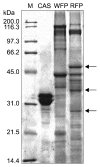Differential Effects of Cod Proteins and Tuna Proteins on Serum and Liver Lipid Profiles in Rats Fed Non-Cholesterol- and Cholesterol-Containing Diets
- PMID: 28702425
- PMCID: PMC5503417
- DOI: 10.3746/pnf.2017.22.2.90
Differential Effects of Cod Proteins and Tuna Proteins on Serum and Liver Lipid Profiles in Rats Fed Non-Cholesterol- and Cholesterol-Containing Diets
Abstract
Fish muscles are classified into white and red muscles, and the chemical composition of the two fish muscles have many differences. Few reports have assessed the health-promoting functions of white fish muscle proteins (WFP) and red fish muscle proteins (RFP). We therefore evaluated the mechanisms underlying the alteration of lipid profiles and cholesterol metabolism following the intake of WFP prepared from cod and RFP prepared from light muscles of tuna. Male Wistar rats were divided into six dietary groups: casein (23%), WFP (23%), and RFP (23%), with or without 0.5% cholesterol and 0.1% sodium cholate. Compared to the WFP-containing diet, the RFP-containing diet supplemented with cholesterol and sodium cholate significantly increased serum and liver cholesterol contents. However, in the RFP groups, an alteration in cholesterol metabolism including an increased tendency to excrete fecal sterols and hepatic cholesterol 7α-hydroxylase was related to the reduction of hepatic cholesterol contents. This phenomenon might be related to the tendency of an increased food intake in RFP-containing diets. These results highlight the differential effects of WFP and RFP on serum and liver lipid profiles of Wistar rats fed non-cholesterol- or cholesterol-containing diets under no fasting condition.
Keywords: cholesterol; cod protein; lipid metabolism; rat; tuna protein.
Conflict of interest statement
AUTHOR DISCLOSURE STATEMENT The authors declare no conflict of interest.
Figures


Similar articles
-
Fish protein hydrolysates affect cholesterol metabolism in rats fed non-cholesterol and high-cholesterol diets.J Med Food. 2012 Mar;15(3):299-306. doi: 10.1089/jmf.2011.1620. Epub 2011 Dec 19. J Med Food. 2012. PMID: 22181072
-
Dietary Tuna Dark Muscle Protein Attenuates Hepatic Steatosis and Increases Serum High-Density Lipoprotein Cholesterol in Obese Type-2 Diabetic/Obese KK-Ay Mice.J Food Sci. 2017 May;82(5):1231-1238. doi: 10.1111/1750-3841.13711. Epub 2017 Apr 19. J Food Sci. 2017. PMID: 28422289
-
A low dietary intake of cod protein is sufficient to increase growth, improve serum and tissue fatty acid compositions, and lower serum postprandial glucose and fasting non-esterified fatty acid concentrations in obese Zucker fa/fa rats.Eur J Nutr. 2015 Oct;54(7):1151-60. doi: 10.1007/s00394-014-0793-x. Epub 2014 Nov 8. Eur J Nutr. 2015. PMID: 25380663
-
The effect of taurine on the cholesterol metabolism in rats fed diets supplemented with cholestyramine or high amounts of bile acid.J Nutr Sci Vitaminol (Tokyo). 2003 Feb;49(1):21-6. doi: 10.3177/jnsv.49.21. J Nutr Sci Vitaminol (Tokyo). 2003. PMID: 12882392
-
Dietary fish protein alters blood lipid concentrations and hepatic genes involved in cholesterol homeostasis in the rat model.Br J Nutr. 2006 Oct;96(4):674-82. Br J Nutr. 2006. PMID: 17010226
Cited by
-
Cod protein powder lowered serum nonesterified fatty acids and increased total bile acid concentrations in healthy, lean, physically active adults: a randomized double-blind study.Food Nutr Res. 2019 Mar 11;63. doi: 10.29219/fnr.v63.3437. eCollection 2019. Food Nutr Res. 2019. PMID: 30890903 Free PMC article.
-
Processing Alaska Pollock Protein (Theragra chalcogramma) into Kamaboko Protein Mitigates Elevated Serum Cholesterol and Postprandial Glucose Levels in Obese Zucker fa/fa Rats.Foods. 2022 Oct 29;11(21):3434. doi: 10.3390/foods11213434. Foods. 2022. PMID: 36360046 Free PMC article.
-
Effects of diets containing proteins from fish muscles or fish by-products on the circulating cholesterol concentration in rodents: a systematic review and meta-analysis.Br J Nutr. 2023 Aug 14;130(3):389-410. doi: 10.1017/S000711452200349X. Epub 2022 Oct 21. Br J Nutr. 2023. PMID: 36268726 Free PMC article.
References
-
- Nanri A, Mizoue T, Noda M, Takahashi Y, Matsushita Y, Poudel-Tandukar K, Kato M, Oba S, Inoue M, Tsugane S Japan Public Health Center-based Prospective Study Group. Fish intake and type 2 diabetes in Japanese men and women: the Japan Public Health Center-based Prospective Study. Am J Clin Nutr. 2011;94:884–891. doi: 10.3945/ajcn.111.012252. - DOI - PubMed
LinkOut - more resources
Full Text Sources
